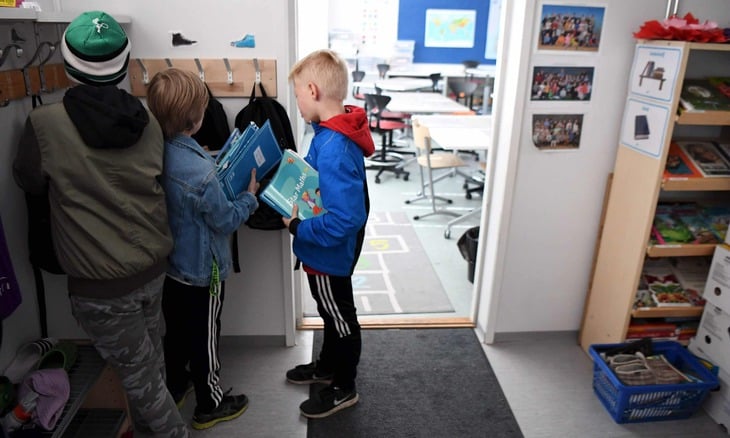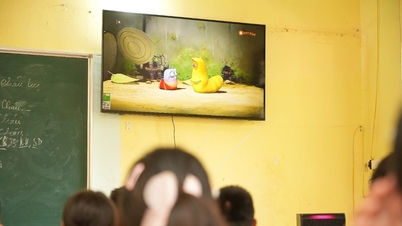
Many studies have shown the negative effects of allowing students to use cell phones in school - Photo: EURONEWS
These bans are intended to create a more focused and safer learning environment for students.
Sweden
Sweden has become the latest European country to ban phones in all schools. The rule will apply from the autumn 2026 school year, for students aged 7 to 16.
All schools and after-school clubs are required to collect and retain student phones until the end of the school day.
France
According to the Guardian newspaper, since September, France requires secondary school students (11-15 years old) to put their phones in special lockers or locked bags and only receive them back when school is over.
This is a tightening of the ban issued since 2018, when students were not allowed to turn on or use their phones on campus, including during recess.
A trial of a “digital break” program in about 100 schools showed a marked improvement in the school climate. Students were more social and active, while bullying and distractions decreased.
Older brother
A nationwide survey by Children's Commissioner Rachel de Souza in April found that nearly all schools in England have banned phones during lessons, amid concerns about the negative impact of the devices on children.
Of the more than 15,000 schools surveyed, 99.8% of elementary schools and 90% of secondary schools had implemented some form of phone ban, mostly requiring students to hand in their devices or not bring them to school.
Some high schools still allow students to keep their phones, but only with teacher permission.
Finland
The Finnish Parliament has passed a law restricting the use of phones and mobile devices in schools, effective from August 1.
Students may only use devices for educational or health purposes with the consent of their teacher. Teachers or principals have the right to confiscate devices if they disrupt teaching and learning.
Schools will also issue more specific regulations on the use and storage of phones during class, mealtimes and breaks.
The Finnish Ministry of Education and Culture will assess the impact of the new policy before proposing further measures in 2026.

Students at a primary school in Helsinki, Finland - Photo: AFP
Netherlands
Since January 2024, the Netherlands has adopted national guidelines recommending a ban on phones in classrooms, and most schools have implemented them.
Nearly two-thirds of high schools require students to leave their phones at home or in lockers, while one-fifth confiscate them at the beginning of class.
A survey of more than 600 school leaders found that 75% said students were more focused, 59% said the social environment improved, and 28% reported improved academic performance.
Researcher Alexander Krepel told the Guardian that students interact more because they no longer have to worry about having their photos secretly taken and spread online.
IDEA
The Italian Ministry of Education has extended the ban on cell phones in schools to secondary schools, starting next school year. Previously, the ban only applied to primary and secondary school students.
Italian Education Minister Giuseppe Valditara stressed that the measure to extend the ban was urgent and could not be delayed, because many studies showed that the abuse or misuse of phones negatively affected the health, mental health and academic performance of teenagers.
Under the new regulations, students are only allowed to use phones in special cases, such as supporting disabled students, students with learning difficulties, or serving lectures - especially technical courses related to information technology.
Earlier in July this year, Mr. Valditara signed a directive banning primary and secondary school students from using phones during school hours and throughout the school day, effective from the 2024-2025 school year.
Source: https://tuoitre.vn/nhieu-nuoc-chau-au-siet-chat-viec-su-dung-dien-thoai-trong-truong-hoc-20250918151932723.htm




![[Photo] "Ship graveyard" on Xuan Dai Bay](https://vphoto.vietnam.vn/thumb/1200x675/vietnam/resource/IMAGE/2025/11/08/1762577162805_ndo_br_tb5-jpg.webp)



































![[Video] Hue Monuments reopen to welcome visitors](https://vphoto.vietnam.vn/thumb/402x226/vietnam/resource/IMAGE/2025/11/05/1762301089171_dung01-05-43-09still013-jpg.webp)





































































Comment (0)